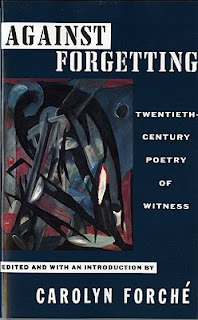by Tom Bair
I will concede that I am, have been, and will continue to be wary of Witness Literature. I am also aware that a part of me shrugs my shoulders to any act of poetry which attempts to disown its own witness. Well, let me be clear: I have not known a poet who claimed to overthrow their body and its receivers and consequently I have not known a poet who claims no witness.
 Even Ashbery, our “Grand Wizard of the Imagined” relays the clumsy patterns of American speech, which he himself has called a “crutch” for his writing. Mimicry of the American tongue is irrefutably an act of testimony, and in the case of Ashbery, he creates the processed cheese of our language. However benign (and perhaps benign testimony is his point) Ashbery sort of points to a thing which sort of exists and says, “sort of”. And this is just a concrete example.
Even Ashbery, our “Grand Wizard of the Imagined” relays the clumsy patterns of American speech, which he himself has called a “crutch” for his writing. Mimicry of the American tongue is irrefutably an act of testimony, and in the case of Ashbery, he creates the processed cheese of our language. However benign (and perhaps benign testimony is his point) Ashbery sort of points to a thing which sort of exists and says, “sort of”. And this is just a concrete example.
If I could find my misplaced ambition, I would make the claim that Ashbery’s content, despite its perceived lunacy, is a method of impressionism which in many ways bares a more trustworthy witness than most poets offer. It is his, and he does not claim that it is anyone else’s.
Anyway, my point is that witness is unavoidable, and thus I distrust both the genre of witness and the genre of no-witness. But, before I proceed, there is an important clarification which must be made. In the case of Ashbery, I have pointed to his stylistic endeavors and asserted that he is a witness. I can feel the global advocates of Witness Literature raising their resolute arms as they prepare to beat me on the knuckles for ignoring the strength of Witness Literature; it makes no claim to style.
Witness Lit’s purest forms (ie Carolyn Forche’s killer anthology Against Forgetting) call upon an enormous aesthetic range. The primary concern is not to propagate or even to assert the validity of any method of writing over another. In the case of Against Forgetting, examples of war, famine, repression, and genocide throughout the 20th century are primary concerns, and the poets’ duty is to catalogue tragedy, to move against indifference or difference, to look at genocide’s nose and call it a nose, or call it a beak, or a shnoz, or write with a pencil in lodged in a nostril, or just live among nostrils, anything that may remind the world that it has billions of pounds of boogers.
But if witness is unavoidable, what is the point of staring at it?
Tags: Ashbery, Forche, Witness




